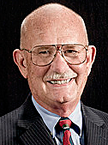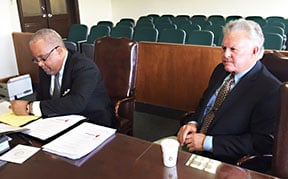Georgetown City Council Gets an Earful from Concerned Citizens
Last Tuesday night’s meeting of the Georgetown City Council had its tense moments, as several motions died aborning, without even winning the second needed to open a discussion.

Council Member Patty Eason’s Agenda Item Q drew about a dozen citizens to the meeting:
“Discussion regarding public concerns relating to press reports about improprieties in the conduct of certain city business over which the Council exercises authority and for which Council is responsible.”
Early in the meeting, under action from the council’s executive session discussions, Eason offered a motion to direct city staff to hire independent counsel to research City Attorney Mark Sokolow’s employment agreement to determine its validity, who wrote the agreement, and the timeline and sequence of events leading up to its execution.
Eason’s motion would have further tasked the independent counsel to investigate the hiring of Assistant City Attorney Bridget Chapman.
As reported by The Austin Bulldog on July 11, City Attorney Mark Sokolow violated the Georgetown City Charter, Section 5.06, which authorizes the city attorney to hire the assistant city attorney but requires the City Council’s approval.
Sokolow did not seek that approval for Chapman, who was hired effective April 19, drawing a salary of $76,907, according to her personnel action form.
Chapman’s hiring was further clouded by the fact that the job posting for the position required applicants to have experience in municipal law, and Chapman’s résumé indicates she has none. What Chapman offered instead was a lot of powerful friends who were references in her résumé.

One of her references was Council Member Pat Berryman. Berryman lives at 206 Champions Drive. Chapman lives two doors down and across the street at 219 Champions Drive. According to records of the Williamson Central Appraisal District, Chapman bought her house May 31, 2005, while Berryman bought hers March 1, 2004.
Knowing other council members would be reluctant to second her motion for this investigation, Eason offered a deal: Second her motion and she would pull Item Q, so the council would not have to hear the likely criticism it would entail.
No sale. Eason’s motion for an investigation died for lack of a second.
Citizen calls for investigation

Ross Hunter, who publishes the popular Georgetown blog OldTowners.com, had signed up previous week, as required by procedural rules, to speak to the council. He stressed the need for the council to use its authority under Section 2.05 of the City Charter to investigate the $13,600 payment to Council Member Pat Berryman and the hiring of the assistant city attorney.
Section 2.05 of the Charter states:
“The Council shall have the power to inquire into the official conduct of any division, department, agency, office, officer, or employee of the City, and for that purpose shall have the power to administer oaths, subpoena witnesses, compelling the production of books, papers, and other evidence material to the inquiry. The Council shall provide by ordinance, penalties for contempt in failing or refusing to obey any such subpoena or to produce any such books, papers or other evidence, and shall have the power to punish any such contempt in the manner provided by such ordinance.”
“It seems the press does a wonderful job of bringing all this information to the attention of everybody. But then we need to turn to government agencies to give us the certified version of the truth. So I’m going to say that it rests with you to decide if in fact you want to use the power that the city charter gives you and conduct an investigation into this,” Hunter said. “And I would suggest your inaction will speak quite as loudly as your action.”
Berryman responded to Hunter’s comments about the $13,600 she was paid. She said the district attorney had looked into this matter “and said there was no basis for prosecution or any further action on this matter.”
Other public comment resisted

Mayor George Garver was clearly uncomfortable about whether it was appropriate to allow citizens to provide feedback on their concerns over recent press reports in The Austin Bulldog and Williamson County Sun. He conceded as much the next day in an interview, saying, “I was struggling with whether this was the appropriate course.”
When Agenda Item Q came up, Council Member Eason introduced it with a caveat: “It is about open government. It is not about character assassination. It is about hearing what people have on their minds. And I think this council needs to be open and unafraid—unafraid to hear what citizens have on their minds—and needs to be willing to listen to that.”
That drew a round of applause from the audience.
Garver spoke after Eason, saying, “I believe very, very strongly in protocol. People have a right to be wrong but they have to follow the process that is part of effective government. The chair’s responsibility has less to do with content and more to do with process.”
Noting that Item Q was not posted for any action to be taken, Garver said, “My personal belief is that government should be as open and transparent as humanly possible. But it has to fall within the constraints of a process that’s allowable by law and by effective governing.”
When some council members objected to allowing people to speak on the grounds that Item Q was not posted for any action, former Mayor Mary Ellen Kersch, who was sitting in the audience, spoke up to remind council that the immediately preceding agenda item (a report by the Arts and Culture Board) also was not posted for action. This drew a mild rebuke from the mayor.
Council Member Pat Berryman said that the city manager had obtained advice from an outside attorney, who advised that “this is not a good idea to proceed with this and recommended that we not do this.”
Mayor Garver asked if there was a motion and Berryman moved “to discuss whether the legal advice was sound and should we discontinue.”
That drew Eason to call a point of order, saying it wasn’t the council’s place to decide whether a council member’s agenda item would go forward.
The mayor said that’s not correct, that under parliamentary procedures the council could postpone an item with a simply majority of four votes.
Council Member Berryman then moved to table the agenda item, meaning the citizens who signed up would not get to speak—and no one seconded her motion.
This was a rare situation for Berryman, who traditionally has been able to rely on at least three other council members to support her initiatives.
After the meeting, Mary Ellen Kersch, a former mayor of Georgetown—and stickler for complying with the City Charter and regulations—told The Austin Bulldog that Berryman’s actions may have violated council meeting rules and procedures, which are set out in the Code of Ordinances, Section 2.24.170.
B. Members shall abstain from voting on matters involving the consideration of his/her own official conduct, or where his/her personal interests are involved. Any member prohibited from voting by this section shall:
1. File a Conflict of Interest Affidavit with the City Secretary stating the nature of the conflict;
2. Upon commencement of consideration of the matter, announce that he/she is excused from voting on the matter; and
3. Shall not enter into discussion or debate on the matter.
Given the amount of bad press that Berryman has gotten in recent months, Kersch argues that Berryman could easily foresee that her own conduct would be called into question and therefore she should not have participated in Agenda Item Q.
Berryman has not responded to an e-mailed request for comments regarding Kersch’s assertions.
The citizens speak
When Item Q was finally allowed to go forward, eight citizens addressed the council.
Sherry Dana said her main concerns were City Attorney Sokolow’s employment agreement and the fact that he had not released his résumé, job application, and most recent performance evaluation, requested by media organizations. “You should hold off on additional contractual protection until these issues are resolved,” she said.
Ellen Davis noted a series of questionable actions, including the firing of a competent outside attorney; the payment to Council Member Berryman, who was a member of the search committee that hired Sokolow; and Sokolow’s hiring of an assistant city attorney who does not meet the qualifications in the job posting. Davis also criticized the lack of responsiveness to open records requests filed by media organizations.
Davis further commented on Berryman’s earlier statement that the district attorney saw no reason to prosecute her for the $13,600 payment. She noted the district attorney was a Republican and that Berryman is a well placed Republican, so that does not resolve Davis’ doubts about the matter. [Berryman has recently worked on the reelection campaign for State Senator Steve Ogden (R-Bryan). Until last December 31 she was on his state staff as a part-time district representative.]
Ruth Roberts said, “I hope you will take to heart what you are hearing from all the people here this evening and examine these issues. Ms. Berryman says she was cleared. We don’t know how she was cleared of any accusations. We don’t know anything about how this assistant city attorney was really vetted.”
Rick Williamson, who helped Ross Hunter start the OldTowners.com blog, said he had read the recent stories in The Austin Bulldog about the city attorney. “If someone wrote a story like this about you, would you not want your name fully and publicly vetted, would you not want it to be investigated and dispensed with in public view? I presume this is what our attorney would want and I know for certain it is what the public wants, because full and open disclosure is always what the public wants,” Williamson said. “The only question is can we count on the council to supply open and full disclosure.”
Ross Hunter got a second chance to address the council under this agenda item, and started by saying “I’ve watched six of you not second (Council Member Eason’s) attempt to create open government.”
“These clouds that are over the heads of people who are being talked about in these stories will never go away and will follow them throughout their whole careers,” Hunter said. “When people in the future look to the Georgetown record, they will see all of the allegations in the press and if you do nothing, then we and the world must accept those stories as the final ultimate truth on this matter.
“It must be obvious to everyone on this dais that the public perception, in the newspaper and on the street, is one of improprieties somewhere… Hunter said. “It’s not really about attorney this or attorney that—it’s about you. It’s about you and about us, and it’s about the ancient partnership between the people and the government. And you will have to work to maintain it, because we have done our part. We have come here not to run you down but to try to build this government up.”
This report was made possible by contributions to The Austin Bulldog, which operates as a 501(c)(3) nonprofit. The Austin Bulldog has many other investigative projects waiting to be funded. You can bring these investigations to life by making a tax-deductible contribution.
This report is licensed under a Creative Commons Attribution 3.0 United States License, and can be republished with attribution and a link to The Austin Bulldog. If you re-use this report, please let us know by e-mailing [email protected] This e-mail address is being protected from spambots. You need JavaScript enabled to view it .









